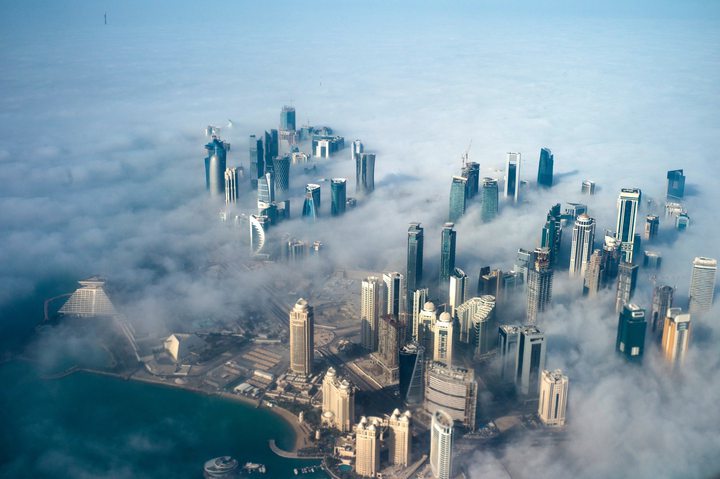5 Arab States Break Ties With Qatar, Complicating U.S. Coalition-Building

The five Arab states not only suspended diplomatic relations, as they have in the past, but also cut off land, air and sea travel to and from Qatar and ordered their citizens to leave the country.
Qatar, like other monarchies in the Persian Gulf, is a close ally of Washington, and it hosts a major American military base that commands the United States-led air campaign against the Islamic State.
As such, the feud among regional allies threatens to stress the operations of the American-led coalition and complicate efforts in the region to confront Iran.
The severing of all connections by Bahrain, Egypt, Saudi Arabia, the United Arab Emirates and Yemen created an immediate crisis for Qatar. Qatari diplomats were given 48 hours to leave their posts in Bahrain, while Qatari citizens were allotted two weeks to depart from Bahrain, Saudi Arabia and the United Arab Emirates.
Qatar, a relatively small country jutting into the Persian Gulf, has a border with Saudi Arabia and is vulnerable to its larger neighbor. It imports almost all its food, about 40 percent of it directly from Saudi Arabia. There were reports of runs on food markets after the announcements on Monday.
Air traffic was disrupted, with the United Arab Emirates suspending service to Qatar by its three carriers, Etihad Airways, Emirates and FlyDubai, beginning Tuesday morning. Qatar Airways was banned from Saudi airspace.
Saudi Arabia said it was taking the action to “protect its national security from the dangers of terrorism and extremism.” The Foreign Ministry of Qatar released a statement saying the action had “no basis in fact” and was “unjustified.”
Last month, Qatar said its state news media had been hacked, after comments attributed to the emir, Sheikh Hamad bin al-Thani, were published referring to tensions with Washington over Iran policy and saying Mr. Trump might not be in power for long. Qatar denied the comments said it had been the victim of a “cybercrime.”
The other Arab states that took action — all but Bahrain majority Sunni — have long sparred with Qatar over its support for the Muslim Brotherhood in Egypt and around the region, including through the broadcasts of the Pan-Arab news network Al Jazeera, which Qatar funds. Qatar’s rivals have also faulted it for condoning fund-raising for militant Islamist groups fighting in Syria, although several of the other Sunni-led monarchies in the region have played similar roles.
Qatar’s opponents have added a third allegation to those grievances: that it is conspiring with their regional rival, Iran. That latest charge is especially striking because Qatar has been actively participating in two wars against Iran, in the Saudi Arabian-led war against the Iranian-backed Houthi group in Yemen, and in the rebel fight against President Bashar al-Assad of Syria, who is supported by Tehran.
There was no clear event in the region that might have precipitated the renewal of the campaign against Qatar. But it followed a recent visit to Saudi Arabia by Mr. Trump, who made clear that he strongly backed Saudi Arabia in its push against both Iran and against Muslim Brotherhood-style Islamist groups. Mr. Trump’s support may have helped encourage the other Sunni states to renew their campaign against Qatar as well.
In another indication of how the Trump visit may have emboldened Gulf monarchies, over the past two weeks Bahrain has cracked down on opposition from its Shiite majority.
At least 5 people were killed and 286 arrested in the crackdown, which came as the government ordered the dissolution of the country’s last opposition group and the shutdown of an independent newspaper. Amnesty International describing it a “blatant campaign to end all criticism of the government.”
Qatar, the richest country in the world per capita, has used that wealth in recent years to play an outsize role in regional politics.
It has taken an important back-channel role with Iran to defuse points of contention in the Syrian war. It has repeatedly brokered hostage and prisoner exchanges, paying millions of dollars to insurgent groups in the deals.
Qatar is also a sponsor of the “Four Towns” agreement in Syria, negotiated with Iran and Hezbollah, in which civilians trapped under siege by government troops or by rebel forces have been bused to other areas. The deals are hailed by some as the only way to rescue civilians, but they have been derided by others as forced displacement according to sect.
Qatar’s riches, and its ambitions to showcase itself as a modern Arab country on the world stage, have also raised tensions even while making it a major player in media and culture.
Yezid Sayigh, a senior fellow at the Carnegie Middle East Center in Beirut, Lebanon, said that the latest diplomatic actions were a more aggressive version of a standoff in 2014, when Bahrain, Saudi Arabia, and the United Arab Emirates pulled their ambassadors from Qatar, citing interference in their internal affairs.
That was part of the feud over Qatar’s backing of Mohamed Morsi, the Muslim Brotherhood leader in Egypt. But that confrontation did not include air and sea blockades, as it does now.
Mr. Sayigh said that the new moves had come as Bahrain, Egypt and Saudi Arabia saw an opportunity to distract from their internal troubles and reflected “bullishness” prompted by the Trump administration’s stances — on the confrontation with Iran and on a willingness to look the other way on human rights violations — “which they see as support of their views on regional threats and the best ways to respond.”
Saudi Arabia received a political and material lift from military hardware deals it signed with the United States at the time of Mr. Trump’s recent visit, Mr. Sayigh said.
Saudi Arabia and the United Arab Emirates are getting “no U.S. pushback” on human rights or on the Yemen intervention, he said, while “Egypt also feels off the hook with Trump, and is using the opportunity to repair ties with the Saudis, reinforce with the Emiratis and be more assertive in Libya.”
But, Mr. Sayigh warned, “Cutting relations with Qatar suggests a worrying readiness to be assertive and belligerent, which masks the countries’ deeper problems and challenges and may prove to be a case of overreach.”
Secretary of State Rex W. Tillerson offered on Monday to broker the impasse in hopes of preserving the Trump administration’s efforts to create broad coalitions against Iran and terrorist groups in the Middle East.
“We certainly would encourage the parties to sit down together and address these differences,” Mr. Tillerson said.
Mr. Tillerson and Defense Secretary Jim Mattis, who appeared in their first joint news conference, in Sydney, Australia, after talks with their Australian counterparts, insisted that the rupture in relations among the Arab states would not undermine the fight against the Islamic State, also known as ISIS or ISIL.
“I am confident there will be no implications,” Mr. Mattis said.
But the escalating confrontation between Qatar and other Sunni-led Arab states presents a fresh and unwelcome complication for the United States military, which has made strenuous efforts to forge a broad coalition against the Islamic State.
How, for example, can the American-led air campaign include warplanes from Bahrain, Saudi Arabia and the United Arab Emirates if those governments will no longer allow their military representatives to be based or even to visit a major United States command base?
Beyond the military difficulties, a host of multinational corporations have operations in the feuding nations. A Saudi call for companies to withdraw from Qatar could present international executives with a blizzard of difficult choices about where to do business.
Qatar is hosting the 2022 World Cup, for instance, and is building facilities for the tournament that are part of an ambitious construction boom, including creating branches of major international museums and universities.




